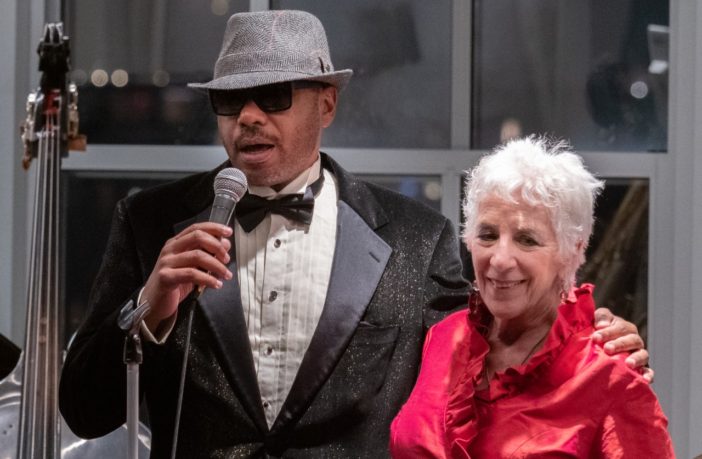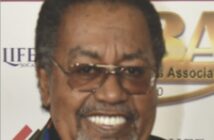Alina Bloomgarden, founder and director of arts program Music On The Inside (MOTI), told the AmNews in a recent interview that it was none other than jazz great Louis Armstrong himself who inspired her to start the program. She was producing a show at Lincoln Center about the music legend when she first learned that he spent time as a child in the Colored Waifs Home for Boys. The then-11-year-old had been sent to the reform school reportedly for shooting six blanks from his stepfather’s .38 revolver at a New Year’s Eve parade. “They had a music teacher and a band and it was the first real music education that he ever had, even though he already loved music,” she said.
The revelation made her pause. “I asked myself, ‘What are we doing for incarcerated youth and adults today?’ Because I know how healing music can be.”
It took another year of ruminating on the subject before Bloomgarden finally came up with the idea for MOTI, a program that takes musicians into prisons as teachers and mentors. As the founding producer of Jazz at Lincoln Center, Bloomgarden had many contacts to whom she turned for help with the idea. “I knew a lot of jazz musicians and had learned over the years that a lot of musicians in general have a tremendous empathy for people who have been impacted by incarceration, and they wanted to help.”
The organization got off the ground in December 2015.
Interestingly, Bloomgarden herself is not a musician but has been a music lover, particularly jazz, for much of her life. It was this enthusiasm for the genre, plus her exposure to musician Barry Harris’s historic Jazz Cultural Theatre, that led to her founding Jazz at Lincoln Center. “I would just feel the healing quality of the music [at Jazz Cultural Theatre]and it moved me so much. I later wrote proposals to consider that jazz had a rightful place in America’s preeminent performing arts center.”
It took a number of attempts over a four-year period, but Lincoln Center’s president at the time, Nat Leventhal, finally gave her the go-ahead. Jazz at Lincoln Center was founded in 1987 and opened in 2004 in Time Warner Center.
MOTI, Bloomgarden said, has been “an amazing experience for me.” The program has worked with adults and some youths at facilities in New York State such as Rikers Island and the Greensboro Correctional Facility, and is expanding to other states. “We already have people in Philadelphia and are working with developing some people out of Georgia,” said Bloomgarden.
The main focus is music mentorship. “We match adults and some youths who’ve served years and sometimes decades in prison, who kept themselves alive through music, one-on-one with a musician on their instrument.” Meetings between mentors and mentees occur in person as well as virtually. Mentors include renowned musicians such as Arturo O’Farrill, Don Braden, and Peter Malinverni.
The program consists of six-week-long “semesters” that culminate in a musical performance.
What makes it special and necessary for Bloomgarden is that it departs from traditional notions of what people who are, or have been, incarcerated need to eventually reintegrate into society. “The main focus seems to be on jobs and housing,” she said. “But our feeling is that people need to feel parity and to feel good about themselves again. Nothing is more immediate to [creating]parity with another person than music.”
One of MOTI’s mentees is Chontay Smith, who served more than 20 years in the Eastern Correctional Facility and Green Haven Correctional Facility. A pianist participating in the mentorship program for the past year, Smith said he also looks to Louis Armstring as an inspiration. “His story is so similar to mine in terms of a man who finds himself through an instrument and through music and the arts.”
According to Bloomgarden, “Chontay is a very naturally talented, musically engaged, person but he never had any real education.” MOTI partnered him with jazz pianist Peter Malinverni. “Peter was giving him real skills and real pedagogy in terms of how to practice and how to understand music theory.”
While incarcerated, Smith created a keyboard using paper, and would memorize the music he heard at the prison’s church services. He would then go back and “play” on his makeshift keyboard. After leaving prison, MOTI helped him hone those skills. “They provided me with mentors and coaches who helped me to develop everything that’s musically inside of me,” he told the AmNews.
Smith also said MOTI provides rewards beyond strictly musical training. “There’s a leadership aspect where they actually helped me become a better leader and find myself through music. They caused me to change and challenge my perspective on life and make better choices. They’ve helped me develop a talent that exceeds my reputation and my past. They have provided me with a better and much brighter future that I wouldn’t have had otherwise. They’ve made the impossible possible for me.”



